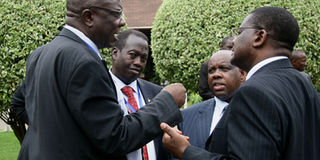State in ambitious geothermal power plan in Baringo

PHOTO | FILE From left: Vihiga Governor Moses Akaranga, Baringo counterpart Benjamin Cheboi, Transitional Authority chairman Kinuthia Wamwangi and former Finance Minister Njeru Githae at a past function.
What you need to know:
- Last week, the county government and the Geothermal Development Company (GDC) entered into a deal that will see GDC establish power plants with a capacity to produce 3,000 megawatts of electricity over the next nine years.
- Although geothermal energy requires a large initial investment, mainly due to the expensive drilling of wells, it is more reliable than hydropower generation.
The government has announced plans to set up geothermal power plants in Baringo County.
Last week, the county government and the Geothermal Development Company (GDC) entered into a deal that will see GDC establish power plants with a capacity to produce 3,000 megawatts of electricity over the next nine years.
The power company has already identified Silale, Paka, Korossi/Chepchuk and areas around lakes Baringo and Bogoria as potential sites for construction of the plants.
According to GDC managing director Silas Simiyu, the project will be carried out in four phases, with the last phase scheduled for completion in 2023.
He said the firm will spend Sh300 billion in the first phase which commences in May.
Speaking last week at a meeting with county leaders led by Baringo Governor Benjamin Cheboi at the Kenya School of Government in Kabarnet, Dr Simiyu and GDC chairman Simon Gicharu said a call for bids for the construction of eight plants of 100MW each in the first phase has been advertised.
Dr Simiyu said that on completion, GDC projects are to generate more than Sh11.5 billion annually with 15 percent of the total revenue being channelled to the county
“The electricity generated will also benefit Turkana County,” he said.
Dr Simiyu said Kenya has a lot of potential in geothermal development with the possibility of producing more than 10,000 megawatts.
When fully operational, the company will channel condensed water from the power plants to irrigate fields for crop production.
The chairman said 576,000 tonnes of water will be released every day to irrigate 57,000 hectares of land.
He said the project will also encourage the setting up of industries because electricity will be cheap.
Although geothermal energy requires a large initial investment, mainly due to the expensive drilling of wells, it is more reliable than hydropower generation.
Mr Gicharu said the GDC is involved several corporate social responsibility projects to benefit locals.
“We will involve locals in all the projects we will undertake for them to be part of the project. We are already drilling more than 10 boreholes. We will also set up feeder roads leading to schools and hospitals,” he said.
Mr Cheboi said the county government would provide an enabling environment for the investors by beefing up security in the project area.




